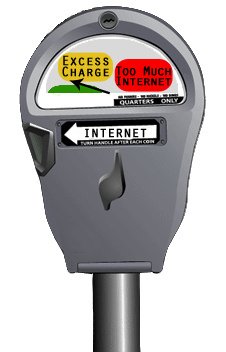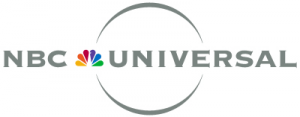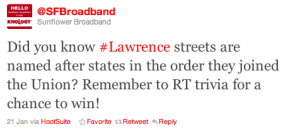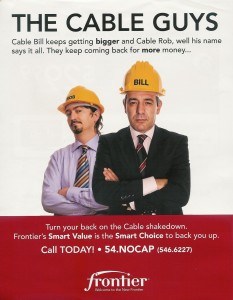
Phillip Dampier: The Blizzard of BS from Canadian ISPs is getting salted and plowed by Canadian media and outraged citizens.
A major ongoing Internet Overcharging campaign by Canadian Internet Service Providers to extract more revenue from consumers has sailed under the radar for more than two years now in most of the Canadian press. Although some newspapers have occasionally covered various telecommunications atrocities related to cell phone pricing, lagging broadband speeds, and an overall lack of competition in the country, specifics about efforts to curtail broadband usage (or monetize its claimed “overuse”) has been a topic mostly discussed on online forums.
No more.
As Stop the Cap! turns more attention to Canadian Internet Overcharging schemes, let this be an object lesson to our American readers about how the game is being played. What starts in Canada could finish American flat rate broadband as well.
CRTC Ruling Lights the Flame
This week, the Canadian Radio-television and Telecommunications Commission (CRTC) finalized rules that will effectively end unlimited broadband service in the country. Remarkably, the Commission’s ruling completely ignores the one group such “usage-based billing (UBB)” impacts the most: individual customers.
The game-changing rules, found in the obliquely-named “Telecom Decision CRTC 2011-44,” effectively establish false usage-based pricing on both the wholesale and retail levels. No provider will actually sell broadband packages that charge only for what a consumer actually uses. Instead, each provider will set arbitrary usage allowances — usage limits — on their broadband accounts. Any remaining unused allowance is forfeit at the end of the month, but “overuse,” at the discretion of the provider, will be penalized with overlimit penalty fees running several dollars per gigabyte.
The CRTC acknowledges, and big providers admit, these Internet Overcharging schemes are all about getting consumers to change their online activities.
[Providers] submitted that UBB rates shape end-user behaviour and that different UBB rates would lead to different behaviours by carriers’ and competitors’ end-customers.
Perish the thought. Without such pricing, Canadian broadband could ultimately offer an alternative to overpriced cable-TV and telephone packages sold by the very providers that advocate limited use plans. Providers insist on predictable, uniform usage. The Commission apparently agrees.
The Commission even acknowledges today’s unlimited use plans in Canada almost always recover the actual costs incurred to provide them, and then some:
The Commission also notes that the flat-rate component of the carriers’ retail Internet service rates recovers most, if not all, of the associated retail UBB costs. In the Commission’s view, this situation provides carriers with the flexibility to adjust or waive retail UBB rates on a promotional basis.
With this in mind, why the CRTC felt radical changes were warranted is only a mystery until you realize most of the commissioners were former employees of the various telecommunications companies themselves.
Birds of a feather….
All of the falderal about the merits of UBB aside, in the end the CRTC threw a small bone to independent service providers not affiliated with super-sized players like Bell, Rogers, Shaw, and Videotron — the Commission ordered they be given a “whopping” 15 percent price break off wholesale rates.
Major carriers were outraged even by this token amount, arguing that providers forced to charge correspondingly higher prices (higher than major carriers charge) could still eke out a place in the market by offering other services or better support. They didn’t need, or deserve a discount.
But independent competitors warned without discounts approaching 50 percent, many will be gone within five years. Many providers argued the major companies, some who received taxpayer subsidies to construct national telecommunications networks, would be able to set wholesale prices artificially high to drive them out of business.
Canada’s Media Reacts
The effective end of flat rate service across Canada finally sparked significant national media coverage of the imminent death of Canada’s broadband revolution, soon to be relegated to a nickle-and-dime metered pricing scheme that will give providers the monetary power to control usage, limit innovation, and have their hands into picking marketplace winners and losers. Don’t like Netflix? Slash usage allowances. Want to protect your cable-TV revenue? Exempt your own online content from the meter as long as you keep your subscription. Want to drive down Canada’s broadband standing in the world? Turn the marketplace over to a handful of companies dreaming of revenue opportunities afforded by monetizing broadband usage.
The Globe and Mail — A metered Internet is a regulatory failure: The CRTC has decided to allow Bell and other big telecom companies to change the way Canadians are billed for Internet access. Metering, or usage-based billing (UBB), will mean that service providers can charge per byte in addition to their basic access charges. The move is sure to stifle digital creativity in Canada while the rest of the world looks on and snickers. […] So there you have it. Just as the world is ready to feast on what Canadians might cook up in the way of multimedia 3.0, Canada decides to meter the Internet, tilting the table sharply towards old-school TV networks and big corporations that can absorb the higher cost of doing business.
Canadian newspapers have covered the story in the greatest detail, but now — finally — Canada’s television news has discovered the story, which for many media critics mean the story is actually “real.”
“If you don’t see it on television, it didn’t really happen,” writes Jim from Halifax, Nova Scotia. “A lot of Canadians don’t read newspapers, and the magazines certainly are not covering this story, so it has been an online-only event until CBC, CTV, and Global put it on their newscasts.”
[flv width=”640″ height=”380″]http://www.phillipdampier.com/video/CBC News Extra Billing for Internet 1-18-11.flv[/flv]
CBC Television reports on the Internet Overcharging controversy. (2 minutes)
Some critics say much of Canada’s commercial media is already in the hands of a tightly controlled, vertically integrated empire. Most of the cable and phone companies have ownership in many major commercial broadcasters, cable networks, and even newspapers and magazines.
[flv width=”640″ height=”380″]http://www.phillipdampier.com/video/Vertical Integration.mp4[/flv]
30 Rock’s Liz Lemon and Jack Donaghy explore the concept of “vertical integration.” Then see how it relates to Canada’s media. (3 minutes)
But even a controlled media environment cannot stop outrage over UBB going viral, as ordinary Canadians realize they are about to pay much higher prices for a service they depend on more and more.
Outrage Commences
While these pricing schemes have been around awhile, now that they are getting well-publicized exposure, consumers have realized the implications of counting how many YouTube videos they watch.
Tens of thousands have signed Openmedia.ca’s online petition, others are complaining to the media and writing their members of Parliament, demanding action.
That will only get louder when consumers start receiving bills for double, triple, or even higher for the exact same quality of service they used to pay less to receive.
“There will be a huge wake-up call for many customers,” said Jared Miller, president of Youmano, a provider based in the Town of Mount Royal.
Charlie Angus, the NDP member of Parliament who speaks about digital issues, said he he thinks the entire pricing scheme is a ripoff that will lead to huge increases in customers’ bills.
“What we need to have is clear and transparent rules so it’s being used in a measured capacity, and it’s not just instituting the principle that every time you turn on the Internet, they can ding you for fees like they do with cell-phones,” Angus said. “We’ve seen this before; when we were told that deregulating cable rates would give customers a big benefit. We were paying 60-to 100-per-cent more in no time.”
“Canada is already falling behind other countries in terms of choice, accessibility and pricing for the Internet,” Angus added.
[flv width=”480″ height=”380″]http://www.phillipdampier.com/video/CTV British Columbia – Canadians rank among most enthusiastic web users 12-28-10.flv[/flv]
CTV British Columbia explores Canada’s love affair with technology and how its integration has dramatically changed the social lives of many families. That’s no surprise, considering Canadians are North America’s most enthusiastic net users. (2 minutes)


 Subscribe
Subscribe








